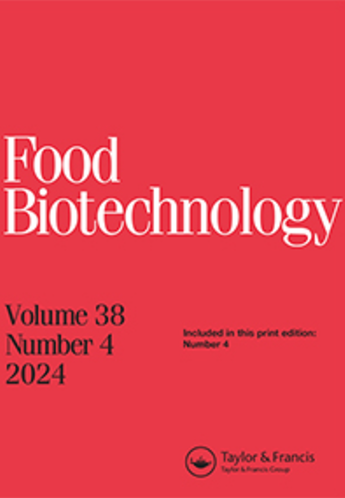乳酸菌22B无细胞上清液保存酸奶抗真菌腐坏及其抗真菌化合物的鉴定
IF 1.6
4区 农林科学
Q4 BIOTECHNOLOGY & APPLIED MICROBIOLOGY
引用次数: 3
摘要
摘要利用乳酸菌(LAB)作为生物防腐剂来控制食品中的真菌腐败是一种很有前途的天然食品保鲜策略。本研究从不同来源分离了300个乳酸菌,并对9种腐败真菌进行了体外抗真菌活性筛选。此外,在酸奶中使用了最具活性的戊型乳酸杆菌22B菌株作为抗真菌腐败的生物防腐剂。基于酶处理后真菌对浓缩提取物的反应、GC-MS和顶空GC-MS对抗真菌化合物的表征表明,戊糖乳杆菌22B可能产生多种活性化合物,包括有机酸、肽化合物、脂肪酸、挥发性化合物和过氧化氢。戊糖乳杆菌22B产生的无细胞上清液在酸奶中的应用表明,在25°C下,它能够在22天内阻止真菌生长。基于酸奶中戊糖乳杆菌的抗真菌活性,该LAB菌株是酸奶生物保藏的潜在候选菌株,该活性已首次通过实验得到证实。本文章由计算机程序翻译,如有差异,请以英文原文为准。
Biopreservation of yogurt against fungal spoilage using cell-free supernatant of Lactiplantibacillus pentosus 22B and characterization of its antifungal compounds
ABSTRACT The use of lactic acid bacteria (LAB) as biopreservatives to control fungal spoilage in food is a promising strategy in terms of natural food preservation. In this study, 300 LAB were isolated from different sources and screened for antifungal activity in vitro against 9 spoilage fungi. Moreover, the most active strain Lactiplantibacillus pentosus 22B was utilized in yogurt as a biopreservative against fungal spoilage. Characterization of the antifungal compounds based on fungal response to concentrated extract after enzymatic treatments, GC-MS, and headspace GC-MS showed that L. pentosus 22B potentially produced a variety of active compounds including organic acids, peptidic compounds, fatty acids, volatile compounds, and hydrogen peroxide. The application of cell free-supernatant produced by L. pentosus 22B in yogurt showed its ability to prevent fungal growth during 22 days at 25°C. This LAB strain is a potential candidate for yogurt biopreservation based on the antifungal activity of L. pentosus in yogurt which has been experimentally confirmed for the first time.
求助全文
通过发布文献求助,成功后即可免费获取论文全文。
去求助
来源期刊

Food Biotechnology
工程技术-生物工程与应用微生物
CiteScore
3.80
自引率
0.00%
发文量
15
审稿时长
>12 weeks
期刊介绍:
Food Biotechnology is an international, peer-reviewed journal that is focused on current and emerging developments and applications of modern genetics, enzymatic, metabolic and systems-based biochemical processes in food and food-related biological systems. The goal is to help produce and improve foods, food ingredients, and functional foods at the processing stage and beyond agricultural production.
Other areas of strong interest are microbial and fermentation-based metabolic processing to improve foods, food microbiomes for health, metabolic basis for food ingredients with health benefits, molecular and metabolic approaches to functional foods, and biochemical processes for food waste remediation. In addition, articles addressing the topics of modern molecular, metabolic and biochemical approaches to improving food safety and quality are also published.
Researchers in agriculture, food science and nutrition, including food and biotechnology consultants around the world will benefit from the research published in Food Biotechnology. The published research and reviews can be utilized to further educational and research programs and may also be applied to food quality and value added processing challenges, which are continuously evolving and expanding based upon the peer reviewed research conducted and published in the journal.
 求助内容:
求助内容: 应助结果提醒方式:
应助结果提醒方式:


